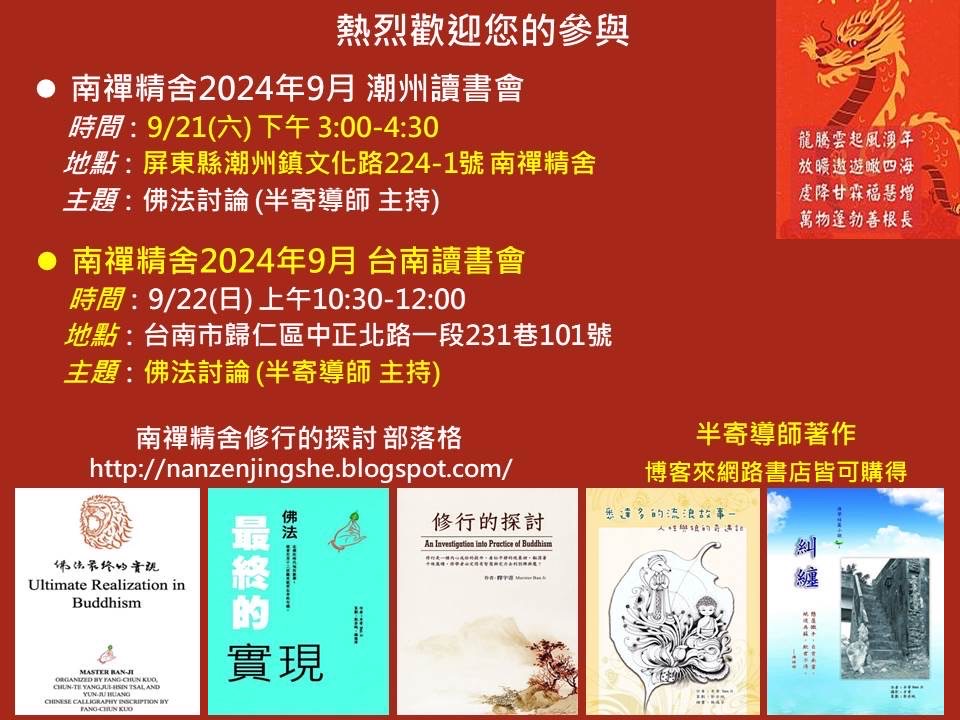南禪朋友好!
在研讀過印順長老與楊郁文教授所提供的佛法後,列了這張表當南禪精舍修行的依據。
我個人不想捲入佛經南北傳的爭議裡,30餘年前便清楚能修行達到佛經四果『色愛』的跨越就此生滿意!
能藉由八不「空」修入『無色愛』的解脫那⋯⋯豈只是仰天長笑而已!
努力再努力!其餘都是小事。
半寄
(無色愛-用現代語簡單說明;指對精神世界的愛執,
涵蓋修行者對四禪八定的禪定愛執不能超越也是其中的內容。)
The Four Fruitions
Greetings, friends of NanZen!
After studying the Buddhist teachings provided by Venerable Yinshun and
Professor Yang Yu-wen, I list this table as a guide to Buddhist Practice at
NanZen Vihara.
I am not concerned about the debates between Theravāda and Mahāyāna Buddhist
scriptures. Since more than 30 years ago, I have clearly understood my life
will be satisfactory and worthy if I can transcend "craving for the form realm" of the four fruitions in Buddhist
scriptures in this lifetime!
And if I can advance further and transcend “craving for the formless
realm" in accordance with śūnyatā explained in terms of "Eight
Negations", then... I will be on cloud nine!
Endeavor and endeavor to practice! And the rest is minor.
transcend meditative concentration of the eight absorptions (dhyāna).
Master Banji
Translated by Grace Jui-hsin Tsai
Proofread by Sophia Fang-chun Kuo
Glossary:
craving for the form realm: in modern words,
(not/unable to transcend) craving for physical world, e.g. one's own body or tangible
objects
craving for the formless realm: (not/unable
to transcend) craving for and attachment to the spiritual world, e.g. pride,
self-love, or practitioners’ failing to transcend meditative concentration of the eight absorptions (dhyāna).
Master Banji
Translated by Grace Jui-hsin Tsai
Proofread by Sophia Fang-chun Kuo
大家好!
照片字謄出
我請陳高登老師把紙張的內容打字出來。
這是他腦血管出血後半年的成績。
南禪精舍修行依據
The approach to spiritual practice at
Nanchan Hermitage
南禪精舍修行依據
善根具足
分別善惡(理智) 慚愧(感情) 正勤(意志)
無明在善根具足時就必須有能力處理
四預流支具足親近善士 聽聞正法 內正思維 法次法向
隨法行人(重慧)
佛不壞淨 法不壞淨 僧不壞淨 聖戒成就
隨信行人(重信)
若於此(五蘊)法以智慧思維、觀察、分別忍是名隨信行,…若於此法,增上智慧思維、觀察忍是名隨法行
The Approach to Buddhist
Practice at NanZen Vihara
Accumulate sufficient merit.
Differentiate between right and wrong
(intellect), cultivate a sense of conscience (emotion), and generate a strong
sense of purpose (volition). Having accumulated sufficient merit, one is
in a position to skillfully deal with ignorance.
Cultivate the four factors of stream entry,
viz., find a reliable teacher, listen to
the true Dharma, properly contemplate the teachings, and practice according to
what one has been taught.
Use discerning wisdom to practice according
to the Dharma.
The four objects of unfailing purity:
Buddha, Dharma, Saṅgha, and the precepts.
Practice on the strength of faith.
Using wisdom to contemplate, observe,
differentiate, and maintain equanimity towards phenomena is called practicing
on the strength of faith;
using wisdom to contemplate,
observe, and maintain equanimity towards phenomena in such a way that one’s wisdom
increases is called practicing according to the Dharma.
初果---斷三結(身見、戒取、疑)
二果---斷三結,貪、瞋、痴薄
三果---斷五下分結(身見、戒取、疑、貪欲、瞋恚)
四果---斷五上分結(色愛、無色愛、掉、慢、無明)Stream-enterer---cuts off three fetters:
self-view, attachment to rites and rituals, and doubt.
Once-returner---attenuates
an additional three fetters: greed, ill will, and ignorance.
Non-returner---completely cuts off greed
and ill will, and is thus free from the “five lower fetters.”
Arhat---cuts
off an additional “five higher fetters”: attachment to the form realm, attachment to the formless realm,
restlessness, conceit, and ignorance.
初果至四果一貫觀法
觀無常、苦、空、無我(舍利弗)
All four stages of realization entail
contemplation of impermanence, suffering, emptiness, and not-self.
「中部」「根本法門經」(南傳)
無聞凡夫---想、思維
有學---知、思維
In the Mūlapariyāyasutta (Discourse on the Root of All Things)
of the Majjhima Nikāya (Middle-length Discourses) of the Theravada school, the
uninstructed worldling is described as perceiving and conceiving, while the
learned disciple is described as directly knowing.阿羅漢---知、不思維、貪、瞋、痴滅盡
如來---知、不思維、知有緣生、生緣老死、一切渴愛滅、離染、滅、捨棄
The arhat
knows without conceiving, desiring, or disliking, and his ignorance is
eradicated.
The Tathāgata knows without
conceiving; he knows that all conditioned things arise dependent on causes and
conditions, that birth is the condition for aging and death; he has completely extinguished
all craving; his defilements have been totally eradicated.
Listed
by Master Ban Ji
Translated
by Ken Kraynak





.JPG)





.JPG)






